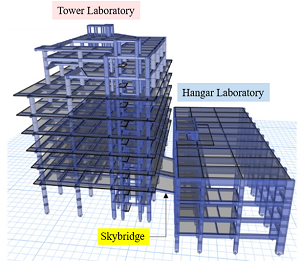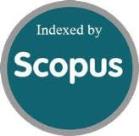Optimizing Seismic Design of Multi-Tower Buildings Using Sky Bridge Isolation and BIM: A Case Study
DOI:
https://doi.org/10.46604/ijeti.2024.13409Keywords:
Building Information Modeling (BIM), multi-tower, seismic design, seismic isolation, sky bridgeAbstract
This research aims to extend prior knowledge of sky bridge isolations in a design case study that complies with building codes, focusing on the design of a multi-tower building linked with a sky bridge and its isolation system. Building Information Modeling (BIM) is used during the design process. Linear time history analysis is performed to capture seismic responses without statistical distortion of response combinations. Link elements are used to simulate the isolations, and the ground motions are excited in bidirectional directions. The experimental results demonstrate that using an isolation system at the sky bridge connection improves torsional behavior, as evidenced by a 12% reduction in torsional mass contribution in the fundamental mode shape of the buildings. Other notable improvements include better lateral force distributions and optimization of reinforcement volume by 36.91% at maximum. Additionally, convenient post-design procedures, such as automated design visualizations and quantity surveys of reinforcements are reported through using BIM.
References
S. Y. Jeong, T. H. K. Kang, J. K. Yoon, and R. Klemencic, “Seismic Performance Evaluation of a Tall Building: Practical Modeling of Surrounding Basement Structures,” Journal of Building Engineering, vol. 31, article no. 101420, September 2020.
G. Li, H. Zhang, R. Wang, Z. Q. Dong, and D. H. Yu, “Seismic Damage Characteristics and Evaluation of Aboveground-Underground Coupled Structures,” Engineering Structures, vol. 283, article no. 115871, May 2023.
F. Meng, X. Ruan, J. Zhao, J. Qiu, L. Meng, and P. Hou, “Analysis of Horizontal Vibration Characteristics of Unequal Height Twin Towers of Rigid Connected Structure,” Journal of Building Engineering, vol. 50, article no. 104146, June 2022.
R. Doroudi and S. H. H. Lavassani, “Connection of Coupled Buildings: A State-of-the-Art Review,” Structures, vol. 33, pp. 1299-1326, October 2021.
A. Soltanzadeh, H. Mazaherian, and S. Heidari, “The Effects of Cultural Behavior on the Evacuation of the First Residential Towers Built in Iran (Case Study: Saman Twin Towers From the 1970s in Tehran),” Journal of Building Engineering, vol. 76, article no. 107231, October 2023.
S. Mahmoud, “Horizontally Connected High-Rise Buildings Under Earthquake Loadings,” Ain Shams Engineering Journal, vol. 10, no. 1, pp. 227-241, March 2019.
X. Chen and J. Xiong, “Seismic Resilient Design With Base Isolation Device Using Friction Pendulum Bearing and Viscous Damper,” Soil Dynamics and Earthquake Engineering, vol. 153, article no. 107073, February 2022.
J. M. Jara, E. J. Hernández, and B. A. Olmos, “Effect of Epicentral Distance on the Applicability of Base Isolation and Energy Dissipation Systems to Improve Seismic Behavior of RC Buildings,” Engineering Structures, vol. 230, article no. 111727, March 2021.
C. Zhang and A. Ali, “The Advancement of Seismic Isolation and Energy Dissipation Mechanisms Based on Friction,” Soil Dynamics and Earthquake Engineering, vol. 146, article no. 106746, July 2021.
M. Teguh, “Structural Behaviour of Precast Reinforced Concrete Frames on a Non-Engineered Building Subjected to Lateral Loads,” International Journal of Engineering and Technology Innovation, vol. 6, no. 2, pp. 152-164, April 2016.
K. S. Numayr, R. H. Haddad, Q. D. Ailabouni, and M. A. Haddad, “Passive Base Isolation System for an Asymmetric Building,” 7th International Conference on Computational Methods in Structural Dynamics and Earthquake Engineering, COMPDYN, pp. 460-472, June 2019.
M. Hosseini and A. Soroor, “Using Orthogonal Pairs of Rollers on Concave Beds (OPRCB) as a Base Isolation System—Part I: Analytical, Experimental and Numerical Studies of OPRCB Isolators,” The Structural Design of Tall and Special Buildings, vol. 20, no. 8, pp. 928-950, December 2011.
S. Jain, S. Pujari, and A. Laskar, “Investigation of One Dimensional Multi-Layer Periodic Unit Cell for Structural Base Isolation,” Structures, vol. 34, pp. 2151-2163, December 2021.
K. A. Al-Nahlawi and J. K. Wight, “Beam Analysis Using Concrete Tensile Strength in Truss Models,” Structural Journal, vol. 89, no. 3, pp. 284-290, 1992.
Q. M. Shakir and H. K. Hanoon, “Behavior of High-Performance Reinforced Arched-Hybrid Self-Compacting Concrete Deep Beam,” Journal of Engineering Science and Technology, vol. 18, no. 1, pp. 792-813, February 2023.
Q. Wu, J. Dai, and H. Zhu, “Optimum Design of Passive Control Devices for Reducing the Seismic Response of Twin-Tower-Connected Structures,” Journal of Earthquake Engineering, vol. 22, no. 5, pp. 826-860, 2018.
D. G. Lee, H. S. Kim, and H. Ko, “Evaluation of Coupling–Control Effect of a Sky-Bridge for Adjacent Tall Buildings,” The Structural Design of Tall and Special Buildings, vol. 21, no. 5, pp. 311-328, May 2012.
W. Guo, L. Guo, Z. Zhai, and S. Li, “Seismic Performance Assessment of a Super High-Rise Twin-Tower Structure Connected With Rotational Friction Negative Stiffness Damper and Lead Rubber Bearing,” Soil Dynamics and Earthquake Engineering, vol. 152, article no. 107039, January 2022.
Z. Zhang, X. Li, B. Chen, and X. Hua, “Closed-Form Optimal Design of the Tuned Inerter Damper (TID) Connecting Adjacent Flexible Buildings,” Engineering Structures, vol. 302, article no. 117419, March 2024.
T. Hamidavi, S. Abrishami, and M. R. Hosseini, “Towards Intelligent Structural Design of Buildings: A BIM-Based Solution,” Journal of Building Engineering, vol. 32, article no. 101685, November 2020.
K. I. Gartoumi, S. Zaki, and M. Aboussaleh, “Building Information Modelling (BIM) Interoperability for Architecture and Engineering (AE) of the Structural Project: A Case Study,” Materials Today: Proceedings, in press. https://doi.org/10.1016/j.matpr.2023.05.408
Z. Ding, S. Liu, L. Liao, and L. Zhang, “A Digital Construction Framework Integrating Building Information Modeling and Reverse Engineering Technologies for Renovation Projects,” Automation in Construction, vol. 102, pp. 45-58, June 2019.
A. B. Aragó, J. R. Hernando, F. J. L. Saez, and J. C. Bertran, “Quantity Surveying and BIM 5D. Its Implementation and Analysis Based on a Case Study Approach in Spain,” Journal of Building Engineering, vol. 44, article no. 103234, December 2021.
H. Feng, D. R. Liyanage, H. Karunathilake, R. Sadiq, and K. Hewage, “BIM-Based Life Cycle Environmental Performance Assessment of Single-Family Houses: Renovation and Reconstruction Strategies for Aging Building Stock in British Columbia,” Journal of Cleaner Production, vol. 250, article no. 119543, March 2020.
S. Kalinichuk and A. Tomek, “Construction Industry Products Diversification by Implementation of BIM,” International Journal of Engineering and Technology Innovation, vol. 3, no. 4, pp. 251-258, October 2013.
G. Brooker and H. Lin, “A Twin-Towered High-Tech Headquarters,” CTBUH Journal, no. 4, pp. 12-19, 2022.
A. Veall, I. Shleykov, A. Rahimian, and K. Moazami, “Atlantis the Royal the Palm, UAE,” International Journal of High-Rise Buildings, vol. 11, no. 1, pp. 51-59, 2022.
A. Syukri, H. Alexander, I. Agus, A. Akbar, R. Bukhari, and D. Hendra, “Quantity Optimization of Structure Works With Building Information Modeling for Politeknik Negeri Padang’s Integrated Technology Laboratory Building Design,” Proceedings of the 11th International Applied Business and Engineering Conference, pp. 1-10, September 2023.

Published
How to Cite
Issue
Section
License
Copyright (c) 2024 Michael Loreantz Steven Tambunan, Jessica Sjah, Ayomi Dita Rarasati, Ryan Sulistian, Bambang Trigunarsyah

This work is licensed under a Creative Commons Attribution-NonCommercial 4.0 International License.
Copyright Notice
Submission of a manuscript implies: that the work described has not been published before that it is not under consideration for publication elsewhere; that if and when the manuscript is accepted for publication. Authors can retain copyright in their articles with no restrictions. Also, author can post the final, peer-reviewed manuscript version (postprint) to any repository or website.

Since Jan. 01, 2019, IJETI will publish new articles with Creative Commons Attribution Non-Commercial License, under Creative Commons Attribution Non-Commercial 4.0 International (CC BY-NC 4.0) License.
The Creative Commons Attribution Non-Commercial (CC-BY-NC) License permits use, distribution and reproduction in any medium, provided the original work is properly cited and is not used for commercial purposes.







.jpg)


